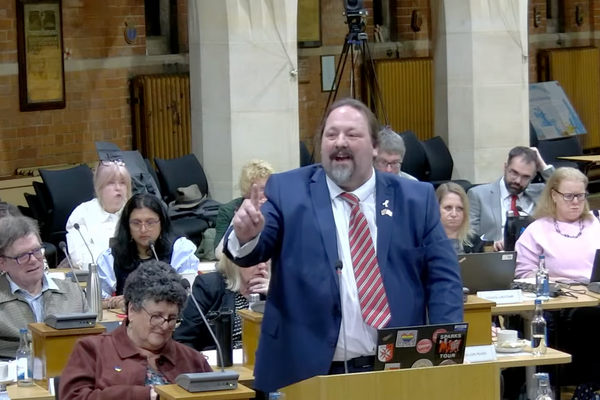Nightingales may face a fresh battle
Plus new public question system begins, Station Road has another 'emergency' closure, news in brief, and more

Could Lodge Hill and its infamous nightingale population once again be facing development? The Guardian believes it could well be under the government’s new Planning and Infrastructure Bill, which looks set to loosen environmental protections. Further down, we look at how the new system for public questions at Medway Council meetings went on its first go, ask why Station Road in Strood needs to keep closing for ‘emergency gas works,’ and, of course, we have our usual news in brief section. Let’s get to it.
Nightingales may face a fresh battle
Long-time readers of Local Authority will know that planning arguments are a familiar part of Medway’s political discourse. While off the radar for several years, few locations have been quite as dramatic as Lodge Hill, a woodland and former military site on the Hoo Peninsula that swung from a key development site to a protected nature area.
Now, there is a chance that things are swinging back the other way again.
Lodge Hill is known for its mix of woodland, open land, traces of military history, and its population of nightingales. It is the last point that led to the site becoming a Site of Special Scientific Interest (Site of Special Scientific Interest) in 2013, which, in theory, gave it firm legal protection from development.

The reality was slightly different. A year later, Lodge Hill was the focus of plans for a major new housing estate, with proposals for around 5,000 homes, even after the area was designated as an SSSI. The plan was dropped following opposition and much debate. Since then, the site has stayed out of the planning process, with no further proposals coming forward.
This week, a Guardian investigation revealed that 5,000 nature sites are at risk under planning reforms the government is currently moving through Parliament. Planning reform is long overdue, and there will inevitably be winners and losers from whatever comes of it.
However, it is stark that the Guardian highlights Lodge Hill as one of ten sites nationwide that are at particular risk from the changes that could allow developers to pay into a “nature restoration fund” in some circumstances rather than having to meet the current requirements that protect SSSIs. They argue that despite the nightingales, reptiles, bats, owls, and rare butterflies that call the site home, the area’s past military use will see it designated as brownfield and thus more available for potential development.
This does mean there are any immediate plans for Lodge Hill on the horizon. The Planning and Infrastructure Bill will take some time to get through Parliament, and then any new plans will have to be developed and submitted. The woodland and its wildlife remain as they were, and surveyors have not disturbed the nightingales.
Still, the Guardian’s decision to highlight Lodge Hill in its list of at-risk sites will inevitably bring renewed attention to the site. What happens in the coming months in Parliament may affect what is possible at Lodge Hill, but for now, the site remains as it is. How much longer that remains the case, though, remains to be seen.
Have a Medway story you think we might be interested in? Get in touch via hello(at)localauthority(dot)news - We’re always happy to talk off the record in the first instance…
New model of public questions seems okay
For the last two years, Medway Council has tried refining democratic processes to make meetings run more smoothly and not last five or six hours at a time. While these haven’t always been successful (see the last full council meeting and its motion bonanza), some changes, like the return of supplementary questions for the public, have seemed like positive steps.
We can’t deny that we were somewhat sceptical of one of the more recent ideas: Moving the vast majority of public questions away from full council and to cabinet meetings. There is a logic in this. Cabinet meets far more often than full council, meaning questioners can get more timely answers. But it also felt like there is more of an event around full council, where the questioner could ask questions in front of a much larger group of councillors and onlookers.
Today was the first Cabinet meeting under the new regime, and at first glance, the new system seems to work fairly well. Only three public questioners submitted questions, but each was answered directly. Whether or not the questioners like their answers is another matter, but the approach felt more informal and less combative than we often see at full council, perhaps partly because the questioner and the councillor answering now face each other directly during the process.
It wasn’t all perfect. Technical issues with the microphones kept cropping up and the acoustics of the St. George’s Centre again hindered things, but that is normal for all meetings there and why Medway Council needs to get on and finish their new council chamber. It was also unfortunate that no opposition councillors submitted any questions to the Cabinet for this meeting, as if this is the new route to scrutinising the administration, it helps if you actually turn up and scrutinise. Overall though, from this one example, it feels like this could be a feasible new way of doing things:
You can watch the Cabinet meeting below, with the public questions section starting around six minutes in:
Why does Station Road keep closing?
If you’ve driven through Strood more than a couple of times in the past year, there’s a good chance you’ve been caught up in traffic clogging up the town centre.
Station Road has been repeatedly closed for days/weeks at a time over the past year, usually under the banner of ‘emergency gas works.’
The most recent closure began on 27 May and was initially scheduled to last until today (3 Jun), but the work permit has now been extended another week (until 10 Jun).
Clearly, something is very wrong around the Station Road area if ‘emergency gas works’ require constant road closures for up to weeks at a time by Southern Gas Networks (SGN), the company that deals with such issues.
Details of road closures are supposed to be fed into the One Network map. While the closure is acknowledged, One Network pointedly highlights that ‘Works Descriptions are not published by SGN.’
SGN’s own website is supposed to display information about emergency works. Despite this, the totality of what they have on Station Road is, ‘Our engineers have been investigating a reported gas leak on Station Road, Strood.’ Perhaps less reassuringly, they also say, ‘It’s too early to say how long this work will take to complete at this stage.’ So, following a full week of closure on a major route, they are no closer to finding this potential leak, let alone resolving it or stopping it from happening every few months.
We asked SGN what was going on, and while they said they would endeavour to get us a comment today, none has arrived. Similarly, we asked Medway Council if they knew what was going on, and no response has been forthcoming.
So it looks as if we are destined to have the Station Road closures with us for a while longer. Maybe, if we’re lucky, we might actually have an explanation for what is so wrong with the gas network there, but we won’t be holding our breath.
In brief
🥂 A new restaurant in Strood will be allowed to sell alcohol until 1am on weekends and 11pm on weekdays despite being within a Cumulative Impact Area. Oceanic Eats X Amala Buka was granted a licence by Medway Council’s Licensing Hearing Panel, who didn’t feel it was safe to let Tesco sell alcohol at any time of the day in Rochester.
🏥 Medway Maritime Hospital is set to receive £4.8m from the government to repair and upgrade facilities. The money will be spent on installing better ventilation systems, repairing machinery, and replacing the nurse call system.
🗑️ Medway Council’s subscription service for additional garden waste bins launched this week. Every household will still have one brown bin emptied every week free of charge, but any additional bins now cost £40 per year.
🦷 Eastgate Dental Practice is proposing a move into the former Lloyds bank building on Rochester High Street. The plans also include converting the upper floors into six flats.
🧑⚖️ A developer is appealing a Medway Council planning committee decision to reject plans for 26 flats in Strood. The planning committee decided against officer recommendations, and without a Local Plan or housing supply in place, risking Medway Council paying legal costs should the developer win.
🏳️🌈 Medway Council has applied for planning permission from Medway Council to flag the Progress Pride flag, D-Day anniversary flag, Windrush Day flag, Disability Pride flag, and Transgender flag on Medway Council’s Gun Wharf headquarters.
More Authority
For our weekend interview, Steven sat down with Stuart Tranter, former Conservative councillor for Rochester West. They discuss local government reorganisation, what happened to the Conservatives in Medway, and how local councils should operate.

We’ve had a couple of features over on our sister Kent Current title that might interest Local Authority readers, too. On Saturday, we interviewed Sexton Ming, one of the founders of the Medway Poets alongside Billy Childish, about his varied career. Today, we looked at some of the more curious place names in Kent in a gentle exploration of our county.
Footnotes
Follow us on social media! We’re on Facebook, Instagram, BlueSky, and Threads, but not that other one.
If you enjoy Local Authority, please share it with your friends, family, associates, and even your enemies. We have no meaningful marketing budget, so we rely on word of mouth from our readers to find new readers. You can even get some sweet, sweet rewards for sending new readers our way. Details here.
Music that soundtracked the creation of this edition: Young and Cool by Woahnows, Blisters in the Pit of My Heart by Martha, and Crunch by Eureka California.






